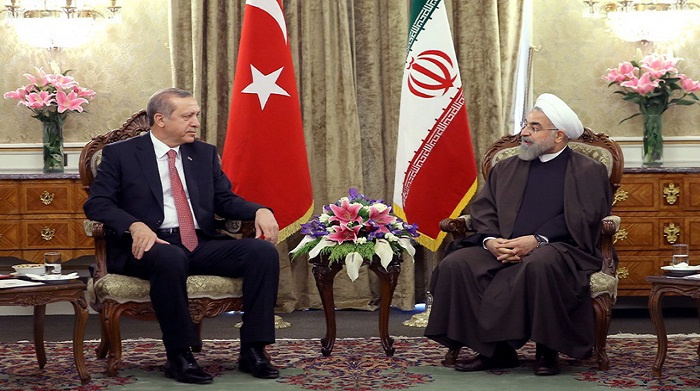Messages of Erdogan’s Visit to Tehran

Erdogan has visited Tehran at a time when his harsh remarks against Iran following the developments in Yemen have left negative impacts on public opinion in Iran; remarks which were faced with the prudence of Iranian officials so that Erdogan would learn a lesson, that the scene of politics is the scene of interaction and logical management under the most difficult conditions.
This visit was Erdogan's second visit, after his visit in February 2013, to Tehran after his presidency. Considering Rohani's visit to Ankara, these three visits indicate the significance of relations between Iran and Turkey and that Turkey is ready to accord itself with Iran's new conditions. During this visit in which Erdogan was accompanied by a number of his ministers, the expansion of relations and regional issues were discussed. One of the most important objectives of this visit was to hold the second meeting of the High Council of Cooperation between Iran and Turkey.
It should be mentioned that the visits made by the highest level officials, aside from the agreements which are reached, are important by themselves and have their own political weights. Iran and Turkey are two important neighbors for each other and the governments of both countries have always attempted to pursue good and expanding relations. In Iran's administration of prudence and hope, relations with neighboring countries are one of the priorities and it is natural that, among Iran's neighbors, Turkey has a special status. Thus, Erdogan's visit to Tehran at the present juncture and considering the critical situation of the region and the steps taken towards reaching a nuclear deal with the P5+1 has special importance.
Following the victory of the Islamic Revolution in Iran, relations between Iran and Turkey have had ups and downs which were sometimes caused by misunderstandings and other times by the competition which existed between the two countries at different levels. During the eight years of war and eight years of the 9th and 10th administrations, the balance of relations between Iran and Turkey were designed in a way which were more beneficial for Turkey and not based on a win-win game. Pursuing policies which led to the imposition of sanctions during those eight years created desirable conditions for Turkey which benefited this country and prevented it from becoming involved in the economic crisis which the West was confronted with.
Aside from the regional and international damages which the ninth and tenth administrations imposed on Iran, relations between Iran and Turkey were distanced from a win-win situation and mutual respect and entered a new framework which had no precedence. Following the coming to power of Rohani's administration, the conditions changed. Turkey, whose foreign policy is based on its own interests, has revealed with Erdogan's visit to Tehran that it has a correct understanding of the new conditions and can provide its interests in the best form possible.
Iran and Turkey have had serious differences during the past four years with regard to the developments in Syria, Iraq and recently Yemen. While Iran has made efforts to prevent its bilateral relations with Turkey from being affected by their regional differences, unfortunately the negative statements made by some Turkish officials against Iran have poisoned the atmosphere of relations. But the prudence of the Iranian officials has prevented their relations from being seriously damaged.
The incorrect analysis of the conditions in Syria, Iraq, ... and pursuing policies based on religious sects in the region by Turkey is considered as a strategic mistake which has entrapped this country and will be to the benefit of the West and the Zionist regime.
Nevertheless, Iran and Turkey are two important neighbors which are influential in the region. Good and expanding relations will provide the national interests of both countries. Certainly, Turkey understands the changes in Iran and will pursue its relations based on the mutual interests of both countries.
One of the most important points on the agenda of Erdogan's visit to Iran was the second meeting of the High Council of Cooperation between Iran and Turkey. If the mentality of interaction is pursued in this council, it could lead to strategic cooperation, otherwise, nothing important will be achieved. It is interesting to note that Turkey has signed strategic agreements with Syria and Iraq and although they have formed joint cabinet meetings, today Turkey has the biggest problems with Damascus and Baghdad.
It seems that the mentality of relations between Iran and Turkey needs to be changed. Iran has shown, through its support for the people of Palestine and the costs that it has bore, that it has distanced itself from the mentality of Chaldoran, but some Turkish officials have believed the delusion of the Shiite Crescent and pursue the policy of the formation of a Sunni front against the Shiites in the region. The first step in this regard is to change the mentalities and views of both countries regarding each other and then draw a map wherein Iran and Turkey would move towards the establishment of a strategic league not only among themselves but also the entire region.
It should be understood that both Tehran and Ankara are significant capitals of the region; as the views of Berlin and Paris have led to the promotion of each capital's situation in global equations. It seems that if Iran and Turkey accept each other's importance, their situation will also be promoted in global equations and the capabilities of each one of them could serve bilateral and regional constructive policies.
The last point is that Erdogan visited Tehran at a time when the issuing of the Lausanne statement shows that the world has accepted a nuclear Iran and the P5+1 has confessed to the great power of Iran. On the other hand, the pursuance of the policy of wisdom, interaction and peaceful coexistence by the Rohani administration sends a special message to Ankara which, if understood, would be beneficial to bilateral and regional relations.

